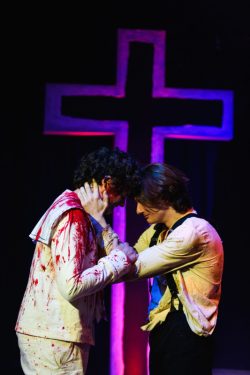 FRANK Wedekind’s semi-autobiographical play Spring Awakenings, written when he was in his mid-20s, has become a popular performance piece for drama students and young actors in recent years, underlining the message that whoever you love or however you love is acceptable.
FRANK Wedekind’s semi-autobiographical play Spring Awakenings, written when he was in his mid-20s, has become a popular performance piece for drama students and young actors in recent years, underlining the message that whoever you love or however you love is acceptable.
The play, which has been censored and suppressed in many societies, is a satirical criticism of repression and pretentiousness, and its subject matter deals with sexual longing, homosexuality, rape, sadism and suicide – so it’s not an easy ride. Poet Ted Hughes created a new version in 1995, and it is that (rather than the more currently familiar Anya Reiss adaptation for Headlong) that Craig Norman chose for the performing arts students from Arts University Bournemouth. Running for more than three hours, it’s no easy journey for the actors or the audience, but a richly rewarding if challenging experience for both.
The director describes it as: “an exploration of the consequences of how adults are failing their children”, underlining the timelessly contemporary problems of failure to empathise, understand and listen to each other, and their devastating potential.
As always with the exciting AUB productions, it’s not only the actors on stage (13 of them here), but a vast number of students from the university’s other courses – make-up, set design and creation, costume, sound, lighting etc – who are adding their skills to each show. Together they transform the versatile space at the Wallisdown campus.
It all starts as two groups of teenagers, each confined in a strictly controlled family and school environment in a small German town, begin to feel the torment and ferment of sexual desire. While their teachers and their parents insist on ever-more arduous study, they are noticing one another in new ways, trying to balance the rapture of their feelings with the scarifying guilt engendered by the adults around them.
Thirty five of Wedekind’s characters are brought to the stage in this translation, which calls for skillful and nuanced doubling, trebling and quadrupling-up by a dozen of the actors – only Wendla, whose tormented confusion is brilliantly conveyed by Scarlett Morris, is not doubled. Her innocent beauty, reinforced by her mother’s inability to explain real life, is the catalyst for the tragedy that unfolds.
Privileged Melchior (Adam Martin) is a highly intelligent young man with a quirkily detached view of the society around him, but his best friend, the timid Moritz (Finlay Whitfield), is terrified by his own burgeoning feelings and wracked with guilt, in spite of Melchior’s well-meaningly humourous explanations.
To say they lead this extraordinary cast should not depreciate the contributions of the others, each of whom creates a handful of memorable characters. Who in the audience will forget the cinematic comedy of the school board meeting, hugely enhanced by the massive mortar boards created by the costume department, from which 31 students were involved in this production.
Clever use of music, some composed by actor Renia Sevastaki, adds to the atmosphere of repressed gloom. Fort Nowhere’s version of Dylan’s Times they are a Changin’ plays it out. Don’t forget the message.
GP-W